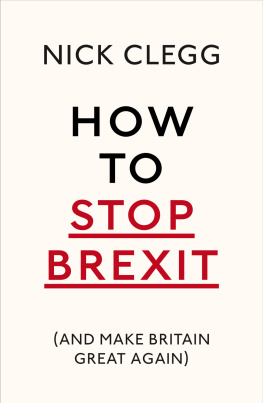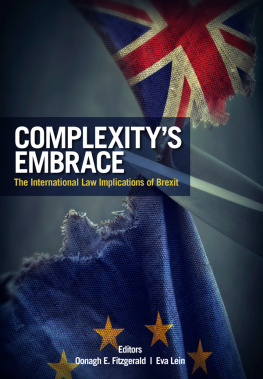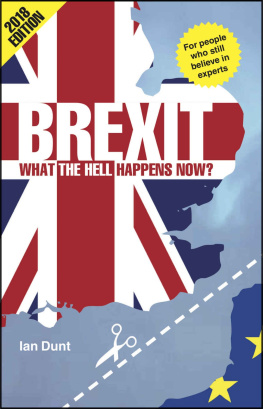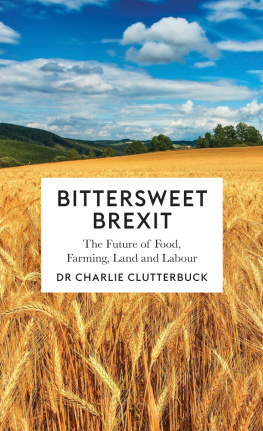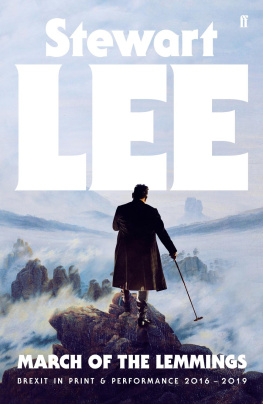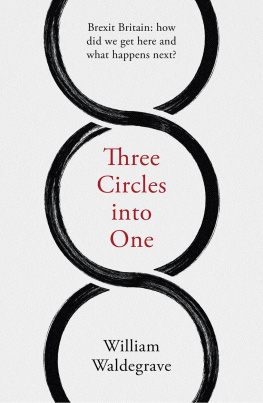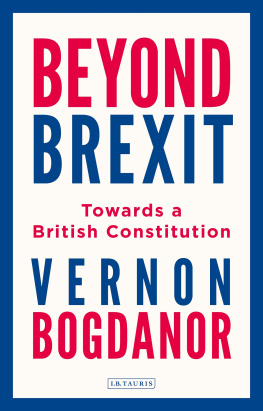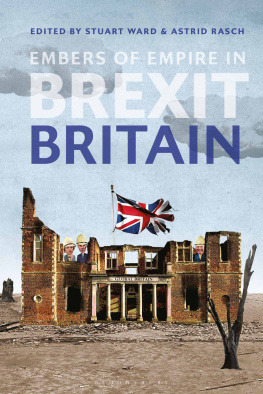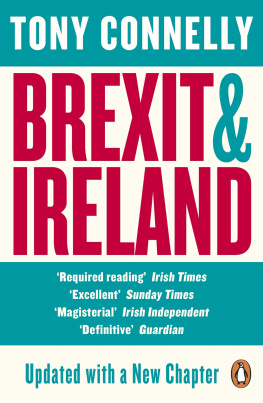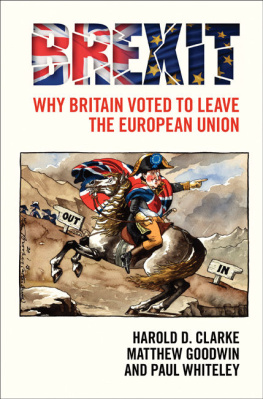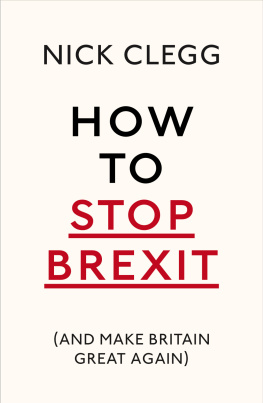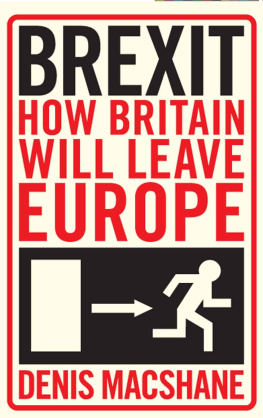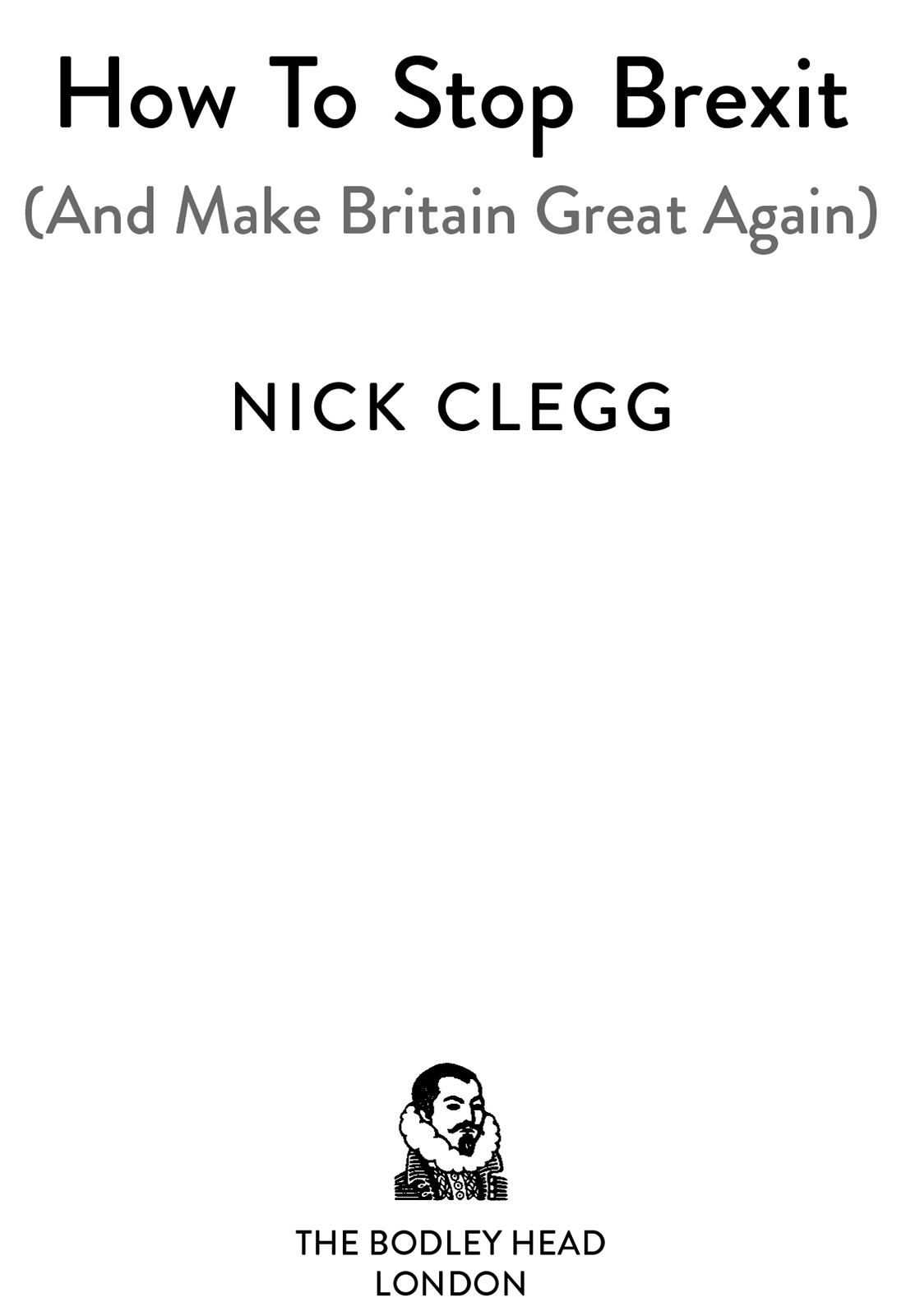Contents
About the Book
KEEP CALM BUT DO NOT CARRY ON.
There is nothing remotely inevitable about Brexit except that it will be deeply damaging if it happens. Extricating Britain from Europe will be the greatest challenge this country has faced since the Second World War. And as negotiations with the EU expose the promises of the Brexit campaign to have been hollow, even some Brexit voters now wish to exercise their democratic right to change their mind, seeing that the most pragmatic option is to stop. It would certainly be the best thing for Britain.
But how can it be done? Havent the people spoken?
No. In this indispensable handbook, Nick Clegg categorically debunks the various myths that have been used to force Brexit on Britain, not by the people but by a small, extremely rich, self-serving elite, and explains precisely how this historic mistake can be reversed and what you can do to make sure that it is.
About the Author
Nick Clegg was Leader of the Liberal Democrats for eight years from 2007 and Deputy Prime Minister from 2010 to 2015. As well as being the Liberal Democrat MP for Sheffield Hallam, he was previously MEP for the East Midlands.
Nick and his wife Miriam were married in her home town in Spain in 2000 and have three young sons Antonio, Alberto and Miguel. He speaks five languages.
Also by Nick Clegg
Politics: Between the Extremes
All men make mistakes, but a good man yields when he knows his course is wrong The only crime is pride.
Sophocles
If a democracy cannot change its mind, it ceases to be a democracy.
David Davis, MP, Secretary of State for Exiting the EU
Introduction
THIS BOOK WILL explain why it makes sense for us, as a nation, to change the decision we took on 23rd June 2016 to leave the European Union. It will then explain how we can do so.
It starts from the premise that, in a free democracy, we are entitled to change our minds. We do this every day in our own lives. From taking the wrong turning in a car to accepting the wrong job or ending a failing relationship we all make mistakes all the time. And we correct them. To err, and then change course, is human.
By contrast, an inability to change course is a restriction of liberty. How can we be free if we cant change our minds when things dont turn out as wed hoped? There is nothing wrong with revisiting a decision, if its consequences dont match the promises made by those who advocated it. As John Maynard Keynes famously declared, When the facts change, I change my mind. And the facts surrounding Brexit are radically different from the expectations raised by those who advocated it, so we have every right to change our minds.
How To Stop Brexit is not primarily aimed at those readers who are fanatically supportive of our membership of the EU or fanatically opposed to it. Nor is it intended for an expert audience well versed in the ways of Whitehall, Westminster and Brussels. It is intended mainly for those people who dont hold their views for or against Brexit especially strongly, and are prepared to think again. Some will have voted Remain, others for Brexit. Many will have voted because they felt a duty to do so, even though they were uneasy about being asked to take such a momentous decision in the first place. Many are feeling increasingly unsettled by the political rancour and economic uncertainty that have followed the referendum, and want to know whether there is a better way forward. This is also a book addressed squarely at those many people who voted for Brexit knowing exactly what they were doing, based on the information given to them at the time, but who now see that Brexit is not turning out the way they were promised, and want to do something about it.
Whichever of these readers you might be, I want to persuade you that you have every right to think again about what we did in 2016; to take back control of your own future and to change course to restore certainty and stability to our country.
If this was little more than a book about the Nightmare before Brexit, then it would plunge me and you, no doubt into a state of despair. Instead, over the following pages I want to lift the mood. I will explain why, in view of political developments in the EU and here in the UK, there is a clear route to Britain changing its mind and putting Brexit on hold. But I want to go further still. This book proposes a number of actions that all of us, in all walks of life, can take, if we want this country to alter course. If enough people were to take these actions and stick to them, then I am sure that Brexit could be stopped.
Whether you voted Remain or Leave, or not at all, on 23rd June, How To Stop Brexit will give you a new-found determination to challenge the anger, vitriol and pessimism that have engulfed our country in the wake of the Brexit vote. Once you turn the final page you will, I hope, feel emboldened and confident that we can take a better decision about the future of our country.
You can stop Brexit. You can help lead Britain towards a new, settled status within a reformed European Union. You can reject the debilitating and poisonous politics of Westminster. You can help give our young people what they crave an open-minded and open-hearted Britain. You can help Britain be a leader in Europe, and the world, again.
In short, to borrow a well-worn phrase, you can help make Britain great again.
There is a silver lining to Brexit
AT THE ENGLISH Channels narrowest point, just over eighteen nautical miles separate Shakespeare Beach in Kent from Cap Gris Nez, and on a clear day you can stand on the British shoreline, peer across the waves and make out the French coastline. Yet the reality is that we are in many ways a country far apart from our continental cousins, with this small stretch of sea representing more than a mere geographical separation. There is a psychological distance, a belief that the British Isles are a long way removed from the many nations with which we share the European hemisphere. We are an island nation, with an island outlook on the world. Yet just at the point that Brexit appears to make us more of an island than ever, it could paradoxically lead to changes in the EU that will offer us a way back in.
Our history weighs heavily, subconsciously perhaps, on how we feel about our place in the world. For more than a thousand years Britain has often viewed the rest of Europe with a mixture of affection, fear and suspicion. Frequently it has been the home of our enemy, with these islands fighting long wars with France, Spain, Tsarist Russia and Germany. A long roll-call of battles is etched permanently into our national historical memory: Agincourt, Blenheim, Waterloo, Dunkirk, the Battle of Britain. This focus on our military past reinforces the feeling of British exceptionalism. Since 1066, no foreign force has successfully managed to cross the Channel and launch a full-scale invasion and conquest of these isles. No other nation on the continent can say the same.
The sense of separation runs deeper still. We have gone it alone before when, in 1534, Henry VIII split from the Catholic Church and defied the authority of the Pope. The defence of our newly established Anglicanism always under threat, real or imagined, from the forces of Rome and the Catholic nations of Europe embedded itself in the national psyche.

